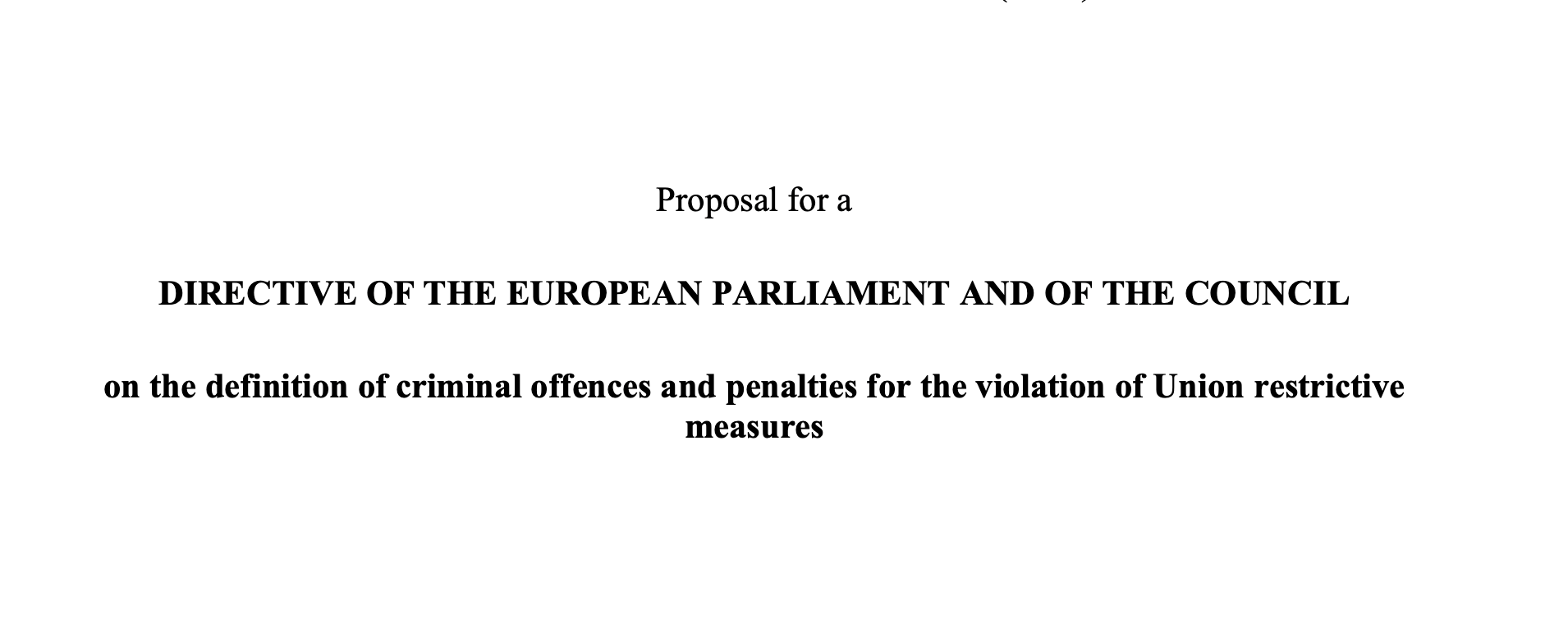Violation of EU sanctions added to the list of EU crimes and forthcoming harmonisation
Following Russia’s military aggression against Ukraine, the EU has adopted a series of restrictive measures[1] and in March 2022 decided to set up a “Freeze and Seize” Task Force[2] to reinforce rules on asset recovery and confiscation and contribute to the implementation of EU restrictive measures, adopted by the EU on the basis of Article 29 TEU and Article 215 TFEU. In this context, on 25 May 2022, in addition to the Directive proposal on asset recovery and confiscation[3], the Commission presented a proposal for a Council Decision[4] on adding the violation of EU restrictive measures to the list of EU crimes laid down in Article 83(1) TFEU[5]. Such a proposal was accompanied by a Communication illustrating how a future Directive on criminal sanctions could look like[6].
As pointed out in its Communication, “restrictive measures are an essential tool for the promotion of the objectives of the Common Foreign and Security Policy (‘CFSP’), as set out in Article 21 of the TEU. These objectives include safeguarding the Union’s values, maintaining international peace and security as well as consolidating and supporting democracy, the rule of law and human rights”[7]. Currently, the Union has over forty different regimes of restrictive measures in place and their use has intensified in recent times. While some of these regimes implement restrictive measures adopted by the United Nations Security Council, in some cases they impose additional restrictions autonomously adopted by the EU[8].
Council decisions establishing restrictive measures require Member States (MS) to take all measures necessary to ensure the implementation of the sanctions, and the penalties must be effective, proportionate, and dissuasive. However, national systems differ significantly as concerns criminalisation of the violation of Union restrictive measures. In the abovementioned Communication is reported that in twelve MS the violation of Union restrictive measures is solely a criminal offence; in thirteen MS, it can amount to an administrative or a criminal offence; and in two MS, it can only lead to administrative penalties[9].
On 28 November 2022, accordingly with article 83(1) TFEU’s procedure, after obtaining the consent of the European Parliament, the Council unanimously adopted a Decision recognizing that the violation of Union restrictive measures does meet the criteria referred to in article 83(1) TFEU, i.e. “areas of particularly serious crime with a cross-border dimension resulting from the nature or impact of such offences or from a special need to combat them on a common basis”, and added it to the area of crimes within the meaning of article 83(1) TFEU[10].
This first step allowed the Commission to present on December 2 a Proposal for a Directive of the European Parliament and of the Council on the definition of criminal offences and penalties for the violation of Union restrictive measures[11].
The Proposal will now go through the ordinary legislative procedure. Once adopted, MS will have six months after the entry into force of the Directive to transpose it into national legislation. Among the objectives of this initiative is the approximation of definitions and penalties for the criminal offence of the violation of Union restrictive measures. Here below are presented some of the main harmonisation measures.
Harmonised definition of:
- Violations of Union restrictive measures, covering violation of individual, sectoral sanctions, arms embargoes, circumvention of sanctions, and breaching conditions under granted authorizations (Arts. 2-3)
Harmonisation of criminal offences. Criminalisation of:
- Violations of EU sanctions, including when committed with serious negligence (art. 3)
- Inciting, aiding and abetting a violation of EU sanctions (art. 4)
- Attempted violations (art. 4)
Harmonisation of penalties
- Minimum penalties for natural persons (art. 5)
- Imprisonment: maximum term of at least 5 years
- Fines: no minimum or maximum requirement (monetary threshold of EUR 100000 is set as a way to distinguish more serious offences punishable by at least 5 years of imprisonment)
- Ensure the liability of legal persons where offences have been committed for their benefit, including where accountable for a lack of supervision or control (art. 6)
- Minimum penalties for legal persons (art. 7):
- Fines: maximum limit of at least 5% of the annual worldwide turnover
- Other penalties: exclusion from public benefits, tenders, grants or concessions; judicial supervision, judicial winding-up; and closure of establishment.
Harmonisation of prosecution :
- Jurisdiction over offences committed by legal persons established in a MS territory and committed for the benefit of a legal person established in a Member State violating restrictive measures in non-EU countries (art. 11)
- Limited periods to investigate, prosecute and adjudicate criminal offences (art. 12)
- Ensure coordination and cooperation at strategic and operational level among MS competent authorities involved in the prevention, investigation and prosecution of offences (art. 13)
- Whistleblower protection (art. 14)
- Effective investigative tools at the disposal of competent authorities (art. 15)
- Cooperation at EU level between Member States, European Commission, Europol, Eurojust and the European Public Prosecutor’s Office (art. 16)
Reporting and evaluation (art. 19)
- MS shall submit the following annual statistics on the criminal offences:
- the number of criminal proceedings initiated, dismissed, resulting in an acquittal, resulting in a conviction and ongoing;
- the types and levels of penalties imposed for violation of Union restrictive measures.
- The Commission is required to submit
- a report on how MS transposed the Directive, two years after the end of the transposition period
- produce a study on the Directive’s effectiveness to evaluate its added value, five years after the end of the transposition period.
Although the Proposal has still to be endorsed by the EU co-legislator and it is uncertain how effective it might be in bolstering the enforcement of EU restrictive measures, one may wonder whether such a harmonization effort could expand to the violation of the Union dual-use trade controls, which constitute another significant tool for the promotion of the objectives of the Common Foreign and Security Policy, aiming at safeguarding international peace and security and upholding EU common values, notably preventing the proliferation of weapons of mass destruction.
[1] For more information on EU sanctions packages against Russia, consult our regularly updated note on the ESU website.
[2] European Commission, Press release, 17 March 2022, available here (last access December 6, 2022).
[3] This proposal aims at strengthening the capabilities of competent authorities to identify, freeze and manage assets, and reinforce and extend confiscation capabilities (Proposal for a Directive of the European Parliament and of the Council on asset recovery and confiscation, COM(2022) 245 final).
[4] European Commission, Proposal for a Council Decision on adding the violation of Union restrictive measures to the areas of crime laid down in Article 83(1) of the Treaty on the Functioning of the European Union, COM/2022/247 final.
[5] Currently, the crimes listed in article 83(1) TFEU are the following: terrorism, trafficking in human beings and sexual exploitation of women and children, illicit drug trafficking, illicit arms trafficking, money laundering, corruption, counterfeiting of means of payment, computer crime and organised crime.
[6] European Commission, Communication from the Commission to the European Parliament and the Council, Towards a Directive on criminal penalties for the violation of Union restrictive measures, COM(2022) 249 final, 25 May 2022.
[7] Ibid.
[8] An ESU publication on this topic will be published in the coming months.
[9] European Commission, COM(2022) 249 final.
[10] Council Decision (EU) 2022/2332 of 28 November 2022 on identifying the violation of Union restrictive measures as an area of crime that meets the criteria specified in Article 83(1) of the Treaty on the Functioning of the European Union, OJ L 308, 29.11.2022, p. 18–21.
[11] European Commission, Proposal for a Directive of the European Parliament and of the Council on the definition of criminal offences and penalties for the violation of Union restrictive measures, COM(2022) 684 final.



No responses yet